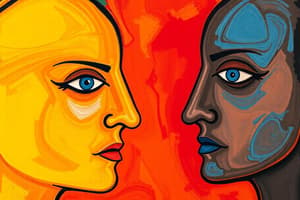Podcast
Questions and Answers
What constitutes the self?
What constitutes the self?
The self is the union of body, thoughts, feelings, and emotions that constitute individuality and identity.
What is personality?
What is personality?
Personality is the set of behaviors, feelings, thoughts, and motives that identify an individual, including stable feelings, thoughts, and behavioral patterns.
What influences personality?
What influences personality?
Personality is influenced by nature (heredity/genetics) and nurture (environment).
What is self-concept?
What is self-concept?
What is the 'actual self'?
What is the 'actual self'?
Name the four quadrants of the Johari Window
Name the four quadrants of the Johari Window
List ways to get to know oneself.
List ways to get to know oneself.
What does trait theory explain?
What does trait theory explain?
Name the traits categorized by the Big Five or Five-Factor Model.
Name the traits categorized by the Big Five or Five-Factor Model.
What is adolescence?
What is adolescence?
List the three phases of adolescence.
List the three phases of adolescence.
What does holistic development combine?
What does holistic development combine?
List aspects of self.
List aspects of self.
What are attitudes?
What are attitudes?
What is a podcast?
What is a podcast?
What is stress?
What is stress?
How can stress manifest?
How can stress manifest?
Flashcards
What is the 'self'?
What is the 'self'?
The union of body, thoughts, feelings, and emotions that constitute individuality and identity.
What is the Johari Window?
What is the Johari Window?
A four-quadrant grid for self-awareness. Includes Open/Free, Blind, Hidden, and Unknown Areas.
What is a Podcast?
What is a Podcast?
A digital medium of audio or video episodes on a specific theme. Podcast formats include conversational, monologue, non-fiction storytelling, and theatrical.
What is Adolescence?
What is Adolescence?
Signup and view all the flashcards
What is the Actual Self?
What is the Actual Self?
Signup and view all the flashcards
What is Conscientiousness?
What is Conscientiousness?
Signup and view all the flashcards
What is eustress?
What is eustress?
Signup and view all the flashcards
What is the Sensorimotor Stage?
What is the Sensorimotor Stage?
Signup and view all the flashcards
What is Appraisal-focused coping?
What is Appraisal-focused coping?
Signup and view all the flashcards
What is holistic development?
What is holistic development?
Signup and view all the flashcards
Study Notes
Knowing Oneself
- The self encompasses body, thoughts, feelings, and emotions, shaping individuality and identity.
- Personality includes behaviors, feelings, thoughts, and motives that define an individual, featuring stable patterns influenced by both nature (genetics) and nurture (environment).
- Self-concept serves as a broad perception of one's physical, emotional, social, spiritual, and other aspects.
- Actual Self: Reflects characteristics developed through upbringing.
- Ideal Self: Represents the self one aspires to be.
- Possible Selves: Encompass hoped-for, expected, and feared future versions of oneself.
- The Johari Window, created by Joseph Luft and Harry Ingham in 1966, enhances self-awareness using four quadrants.
- Open/Free Area: Information known to both oneself and others.
- Blind Area: Information unknown to oneself but known by others.
- Hidden Area: Information known to oneself but unknown to others.
- Unknown Area: Information unknown to both oneself and others.
- Self-knowledge can be achieved through introspection or self-analysis, reflective journaling, self-awareness, and self-affirmation like gratitude or self-love practices.
- Trait theory, including the Big Five or Five-Factor Model by Costa and McCrae, explains individual uniqueness:
- Openness to experience: Involves curiosity, interest, imagination, and creativity.
- Conscientiousness: Relates to planning, organizing, hard work, control, perseverance, and punctuality.
- Extraversion: Includes sociability, talkativeness, activity, outgoingness, and a fun-loving nature.
- Agreeableness: Characterized by friendliness, warmth, trust, generosity, and kindness.
- Neuroticism (emotional stability): Signifies calmness, relaxation, and comfort.
The Whole Self
- Adolescence marks a transitional phase to adulthood, involving transformations physically, cognitively, emotionally, and socially.
- Early Adolescence (10-14 years): Starts with puberty, leading to physical and emotional changes.
- Middle Adolescence (15-17 years): Physical growth slows for females but continues for males, accompanied by emotional shifts, self-consciousness, long-term goal setting, and an interest in the meaning of life and moral reasoning.
- Late Adolescence: Features fewer physical changes, more cognitive development, increased emotional stability and independence, rational thinking, future planning, and a stronger sense of identity.
- Holistic development is the combination of physical, mental, social, emotional, and spiritual elements.
- Aspects of self include:
- Physiological: Encompasses physical attributes and the five senses.
- Cognitive: Involves intellectual self, thinking, and mental processes.
- Psychological: Focuses on emotional self, thinking styles, feelings, and behaviors.
- Social: Considers interactions with individuals or groups.
- Spiritual: Encompasses personal consciousness and beliefs, including values and virtues.
- Feelings, moods, emotions, attitude, and behavior are related but distinct. Emotions are reactions to stimuli; feelings come from interpreted emotions; moods are conscious states of mind, attitudes are thoughts, feelings, and emotions about a person, place, or thing,
- Behavior is the outward manifestation of attitudes and thoughts influence feelings and responses. Beliefs influence thoughts, words, actions, habits, values, and destiny.
- Managing emotions, thoughts, moods, and behaviors is important.
- A podcast is a digital medium of audio or video episodes on a specific theme, presented in formats like conversational, monologue, non-fiction storytelling, and theatrical.
Developmental Stages
- Developmental stages are categorized through various theories.
- Sensorimotor (0-2 years): Coordination of senses with motor responses, object permanence.
- Preoperational (2-7 years): Symbolic thinking, imagination, intuition.
- Concrete Operational (7-11 years): Concepts attached to concrete situations.
- Formal Operational (11+ years): Theoretical, hypothetical, and abstract thinking.
- Havighurst's Developmental Stages include conflicts for each stage:
- Infancy (birth to 18 months): Trust vs. Mistrust, caregivers are important.
- Early Childhood (2-3 years): Autonomy vs. Shame and Doubt, parents and caregivers are important.
- Late Childhood/Preschool (3-5 years): Initiative vs. Guilt, family and teachers are important.
- School Age (6-11 years): Industry vs. Inferiority, teachers and peers are important.
- Adolescence (12-20 years): Identity vs. Role Confusion, peers and role models are important.
- Young Adult (20-40 years): Intimacy vs. Isolation, partners and friends are important.
- Adulthood (40-65 years): Generativity vs. Stagnation, family and community are important.
- Maturity (65 years to death): Ego Integrity vs. Despair, society at large is important.
Freud's Psychosexual Theory
- Personality development is driven by progression through erogenous zones; failure in a stage can cause fixations.
- Oral Stage: Focus on infant's mouth, rooting, and sucking reflex.
- Anal Stage: Centers on controlling bladder and bowel movements.
- Phallic Stage: Focuses on genitals, discovering gender differences, and involves the Oedipus complex (boys) and Electra complex (girls).
- Latency Stage: Sexual interests are dormant, with focus on other developmental tasks.
- Genital Stage: Strong sexual interest in the opposite sex, interest in others' welfare and the goal of balancing life areas.
Psychosocial Development
- Erik Erikson's theory focuses on social influences on personality throughout life, not just childhood.
- Stage 1: Infancy (birth to 18 months), Trust vs. Mistrust.
- Stage 2: Early Childhood (2-3 years), Autonomy vs. Shame and Doubt.
- Stage 3: Late Childhood/Preschool (3-5 years), Initiative vs. Guilt.
- Stage 4: School Age (6-11 years), Industry vs. Inferiority.
- Stage 5: Adolescence (12-20 years), Identity vs. Role Confusion, experimentation and evolving beliefs are common.
- Stage 6: Young Adult (20-40 years), Intimacy vs. Isolation.
- Stage 7: Adulthood (40-65 years), Generativity vs. Stagnation.
- Stage 8: Maturity (65 years to death), Ego Integrity vs. Despair.
Coping With Stress
- Stress arises from mental or emotional strain due to adverse or demanding situations; it involves how we respond to threatening events. Managing stress involves maintaining a healthy mind, body, and environment.
- Sources of Stress include:
- Environmental factors such as life events and daily hassles, natural or human-caused.
- Sociocultural factors like social status, generation gaps, disability, unsafe environments, and economic conditions.
- Stressful events include traveling, socializing, celebrating occasions, graduating, relationships, and leadership roles.
- Classifications of Stress:
- Catastrophes: Sudden, unpredictable events.
- Major life events: Significant personal changes.
- Daily hassles: Regularly occurring annoyances.
- Stress can manifest as eustress (motivating) or distress (threatening). Distress can be acute (intense, short-lived) or chronic (less intense, longer-lasting).
- Coping Strategies:
- Appraisal-focused coping: Using the ABCs (activating event, belief, consequence).
- Problem-focused coping: Confronting the problem, problem-solving, seeking help, time management, assertiveness.
- Emotion-focused coping: Handling emotions, exercise, relaxation, meditation, releasing emotions, enhancing emotional skills, forgiveness, positive thinking, self-control, seeking help, counseling.
- Filipinos seek help and support from family.
- To manage stress, one needs positive reactions, problem-solving, and positive thoughts, as stress affects mental health.
Studying That Suits You
Use AI to generate personalized quizzes and flashcards to suit your learning preferences.




